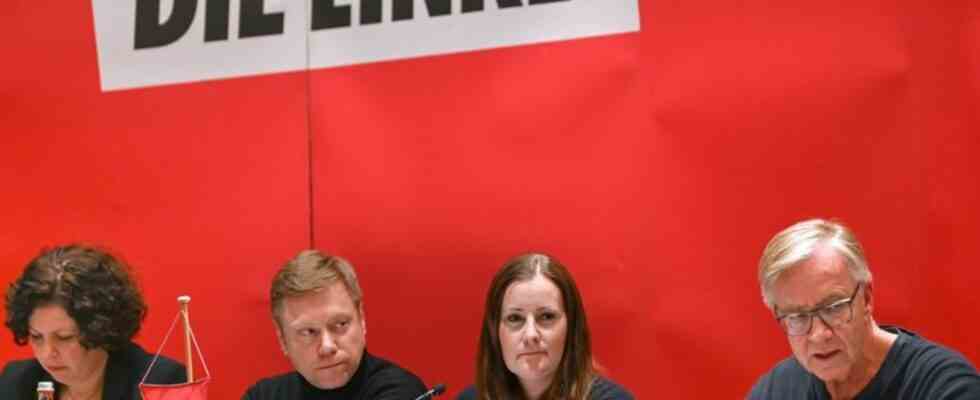parties
Left braces itself against the decline – against Wagenknecht
The party and faction leaders of the left, here (from left) Amira Mohamed Ali, Martin Schirdewan, Janine Wissler and Dietmar Bartsch, have agreed on a “Leipzig Declaration”. photo
© Heiko Rebsch/dpa
After a series of electoral defeats and constant arguments, the left is in crisis. Now the “Leipzig Declaration” is supposed to close the ranks. But a comrade is not there.
For months, the left was almost exclusively about Sahra Wagenknecht. The former parliamentary group leader publicly quarreled with the line – and the weakness – of her party and brought a new foundation into play. Chairmen Janine Wissler and Martin Schirdewan countered at the weekend. They rallied all important party officials with a “Leipzig Declaration” behind their course – not only for more redistribution and social issues, but also for strict climate protection and more distance to Russia. A broadside against Wagenknecht.
Can that avert the split in the left? Wagenknecht himself initially kept a low profile. Bundestag faction leader Dietmar Bartsch tried new confidence. “Leipzig has opened up the chance for the left to return to the road to success,” he told the German Press Agency on Sunday. “Politics, politics and more politics is the simple recipe.”
Challenge five percent hurdle
The “Leipzig Declaration” describes the crisis of the left, which failed in the federal election and the last four state elections at the five percent hurdle. In the Bundestag, it is only in parliamentary group strength because three candidates won direct mandates.
The paper says that the left is a “historic achievement” but that it is in danger: “There is even public speculation about the formation of an alternative party project. On the other hand, we are ready to fight for our common party, the historic project to defend and develop a united, plural socialist party.”
The top duo Wissler and Schirdewan, elected in June, had only invited officials to the retreat in Leipzig – the federal executive board and the leaders of the parliamentary group, the state associations and state parliamentary groups. 64 participants came. Wagenknecht was not there due to lack of party office.
With her pointed theses and her talk show talent, the member of the Bundestag is perhaps the most well-known leftist, more prominent than the two chairmen. But the 53-year-old always takes different positions than the majority of the party. She sparked outrage in her own ranks with a speech in the Bundestag in September, when she accused the federal government of “starting an economic war” against Russia. She wants cheap oil and gas imports from Russia to continue.
Completely different direction
Wissler and Schirdewan, on the other hand, call for a rapid move away from fossil fuels and sympathize with the radical climate protectionists of the “last generation”. The “Leipzig Declaration” also advocates “promoting the energy transition”.
While Wagenknecht sees the USA and NATO as partly responsible for the Ukraine war, the party paper blames Russia and emphasizes: “We are committed to Ukraine’s right to self-defense and call for the full restoration of Ukrainian sovereignty.” Another dissent: Wagenknecht recently described the Greens as the most dangerous party in the Bundestag, while many leftists attribute this role to the AfD. The “Leipzig Declaration” announces “a clear edge against the right”.
In addition, the paper reaffirms the left-wing core of the brand. These include financial redistribution from top to bottom, a “strengthening of the public sector” for basic needs such as housing or energy supply, more help for the poor and overcoming the debt brake. Diplomatic initiatives are being called for to end the Ukraine war.
Strength is the goal
In the upcoming elections, the party wants to secure government participation in Berlin and Bremen and become as strong as possible in Bavaria, Schleswig-Holstein and Hesse. Unsurprisingly, it says: “Our goal is therefore to strengthen the left in the coming elections.”
Wagenknecht initially did not comment on any of this. But her confidant Sevim Dagdelen said: “The statement does not position itself clearly against arms deliveries to Ukraine or against energy sanctions against Russia, which massively harm the vast majority of the population here.” Anyone who ignores central points can “difficulty regain lost trust”.
Former member of the Bundestag Sabine Zimmermann, also a confidant of Wagenknecht, reacted even more bitterly. “It should now be clear to the last of the party that the party leadership would like to push Sahra Wagenknecht and her supporters out of the party.” It is obvious that Wissler and Schirdewan would prefer a silent retreat by Wagenknecht – if possible without taking many comrades or voters with them. Polls are attractive for the party rebel, however. In mid-November, 20 percent of those surveyed nationwide for the “Spiegel” said they could imagine voting for a new Wagenknecht party.

